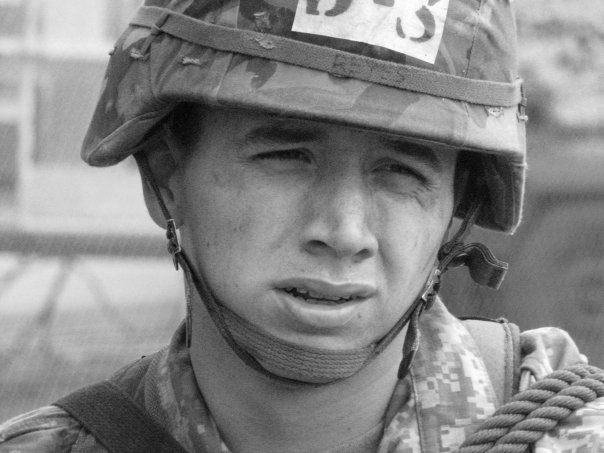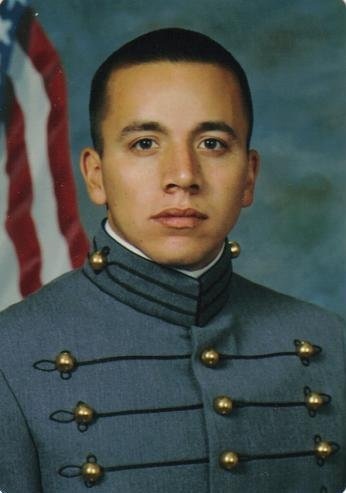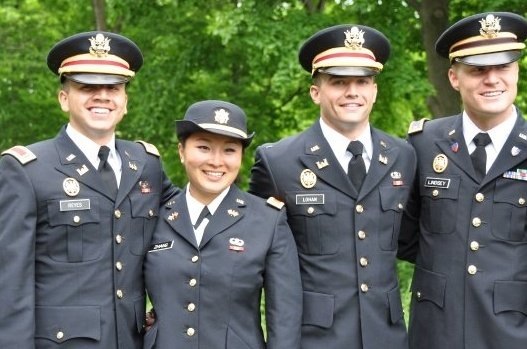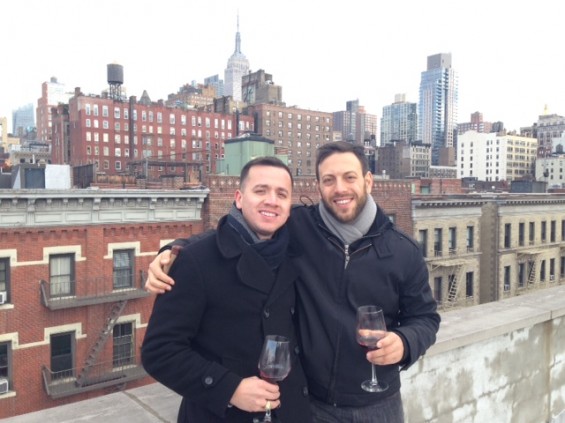David

SECOND LIEUTENANT, U.S. ARMY, 2004-PRESENT
DAVID ON THE NEW FREE GAY AND LESBIAN GENERATION OF CADETS:
I think I’ve always known I was gay. I grew up in a very Catholic family here in the states, in South Florida. Our church was located right in the middle of Wilton Manner. So I was exposed to it, my family was exposed to it. I was an alter boy. I was in middle school the first time I went to confession and told my priest that I’m gay and to this day. I’m still really good friends with that priest. He’s become more of a mentor, a spiritual mentor in my life. He told me, god loves you no matter what. So that was good, really good.
When I first went to my first unit in Seattle, Fort Lewis, I went from having a lot of gay friends in the military at West Point to having an all male unit where I was the platoon leader. I was one of the few officers in the unit and the expectations of you as an officer are very different than at West Point as a cadet. I definitely felt more repressed when I was in Seattle. But a lot of our underground gay friends at West Point ended up being stationed in Fort Lewis, and that helped a lot, having that support group there. But I never told anyone in my unit there, that I was gay. They would always ask me what I would do on the weekends. If they saw me hanging out with a female officer, automatically they would assume I was dating her and I would go along with their assumptions sometimes just to cover up the fact. But it was very different being in the Army as opposed to being a cadet. That fear in the real Army is definitely there.

It was hard, because I had my straight friends on one side, the people who didn’t know about me on the other hand, and I had the people who knew and were totally accepting, I would say- my real friends. Deploying to Afghanistan I didn’t know anyone within my unit, it was completely shut down- that aspect of finding some one to talk to about being gay was different. It was harsher in an all male unit. There was no filter- people would say things, throw around the word faggot all the time, gay this, gay that. And I would definitely pitch in with hey, It’s not right to say this but I was also afraid of coming out, so I’d never full on say squash this. Don’t say this anymore.
In Afghanistan it would happen a lot, people saying “faggot, faggot.” It really got to me. I wondered, why I am in an organization where people feel like this and why am I putting myself through this? There was some soul searching: “why am I doing this? Why did I come to West Point? Why did I join the military? Why am I putting myself through this when I could have done something completely different with my life?”
But there’s a lot of positive in the military that outweighs those negative. I remember when I first came to Afghanistan, before DADT was repealed, my commander made a comment, I don’t care if you sleep with a man, woman, whatever- as long as you’re a professional officer, you came here to serve your country and be a soldier and that’s what matters. So the fact that my commander, the one that I looked up to acknowledged that there were gay people in the military by making that statement- to me that was reassuring and a push as to why I was doing what was doing.
But it was tough. I hated that constantly, constantly I had to lie about little things. And one lie led to another lie and that was definitely eating me up. All the lying, faking names….I had to give a fake name if I was dating someone- and that was emotionally draining to just have to continue these lies.
People want to know about your personal life in the military. People are encouraged to make your family and your personal life a part of the military. It’s not a separate entity. So people are always asking questions about your personal life. Even if you’re more reserved, like me because I’m gay, people are more curious about it. They say, if you’re not dating someone: let me set you up with this person, or that person. At the time, everyone would bring up their wives, their fiancées, they wanted to vent. And I couldn’t. I listened. I was always just the listener. Even if I did have my own issues, I couldn’t talk about it unless I used fake names. I hated that, that was the worst part, having to lie and make up stories about things.
I recently came out to one of my soldiers, I’ve known him for four years- we deployed together to Afghanistan. I told him that I was gay and I introduced him to Javier, my boyfriend. And he has really great about it. He said I can’t imagine what you were going through, I’m really sorry I wasn’t there enough. He was really good about it. I think he felt bad, because he was there with me, he knew what went on and maybe even remembers comments that he made.Maybe he put himself in my shoes, having to live out a secret life for three years. That in itself….
But he had no idea- we used to go out, go to soccer games. We couldn’t have an open discussion, or talk about it in that time. I think it’s a little bit of the culture in the military. I definitely feel like I underestimated a lot of my friends in the past who I’ve now come out to. At the end of the day, it doesn’t really matter, we want each other to be happy. A lot of friends have said, I love you brother, I love you no matter what.
I don’t feel like a victim in the military. I chose the military and I love to be in the military. I wish some things hadn’t been the way they were in terms of there being a policy where you have to lie about yourself.
But it’s definitely the culture. It’s changing rapidly. Part of it is people just not being exposed to it. Knowing someone gay and seeing that they are doing exactly what you’re supposed to be doing. People are okay with that. For a lot of people, it’s their first time seeing someone who was gay. I would go as far as to say it’s like the integration of blacks in the military. I had soldiers from Alaska and the first time they saw black people was in the military. It’s shocking to them, but soon they accept and realize this is my comrade, this is the person I deploy with, this is the person by my side- just like a gay person. At the end of the day, you’re preparing to go to combat together and to defend each other.

For me, I always feel a level of shame coming out but I think it’s extremely important to come out, so that people know that there are gay people in the military, that there have been gay people in the military, and that we are all striving to do the same thing, which is to serve our country. Regardless of whether people acknowledge that there is no longer a policy in place with which people can discriminate against gay people in the military, if they don’t see a gay person, if they don’t acknowledge there are gays in the military- we can’t move forward.
When the policy repealed, they showed it in the news, we had a training. All I remember from the meeting was that the policy changed. But no one talked about it after. It was a silent topic that no one talked about anymore. No one has had dialogue or a conversation about what this actually means, the importance of it. It’s important for people to come out.
The more people who come out, the less weight that rests on the shoulders of those who have already come out.
It’s still hard for me, something I have to do little by little. Actually, a lot of people won’t say whose your wife? Do you have a girl? They will ask, who is your partner? Who is your spouse? It’s changing a lot. There are still a lot of people who are so fixed on hiding, I am sure there are still a lot of people who will never acknowledge they are gay- because of that shame, that constant of having to hide it in the military. I know a lot of people who still won’t come out. I think it’s part of being in the military, always having to lie about it. It’s hard to live those two lives, to balance everything, to have multiple relationships with people based on what they know about you, as opposed to just being open about everything and not having to worry about what I can say to this person versus what can I say to that person? That’s how it was for me at the time.
I was in Southern Afghanistan for about 5 months, doing clearance- leading a platoon to find IEDs. When I left to go to Afghanistan I was nervous, I thought what if something happens to me? I hadn’t told my parents, a lot of friends at that point. People wouldn’t know the full me, the full David, just half of me. My deployment was pretty smooth unlike some others. I know of some gay military personnel who died in combat and their unit never knew, their unit finds out when this person dies that they have a same sex spouse. And that’s a really sad situation for everyone involved.
DADT made it so that it takes a long time to fully trust people. Even now, I’m very hesitant to talk to people. I don’t know if I fully know what it’s like to work with someone I really trust. There is always some hesitation. I trusted people to a certain degree, but I don’t know if I ever had that feeling, that sense of full trust in my deployment. I am sure it affected my job. I am sure it did. Having to worry about changing the pronouns of the person you’re dating when you’re in combat is a lot of undue stress.

Initially I joined because I really wanted to serve, I knew I was gay but I was 18 and I don’t think I fully acknowledged what being gay was, what having a gay lifestyle would be. But very early on you develop a sense of pride for what your doing. The other friendships I’ve made in the military with other LGBT people have been the foundation for why I continue to serve. The friendships I’ve built in the military are unlike any others. We have a really strong bond. There are some down days, it’s confusing that I am a part of something where I am not acknowledged, but we are a very small part of something bigger than ourselves. I always had a sense it would end at some point. It’s very hard to answer the question of why I am a part of something that doesn’t acknowledge me. I’ve never seen myself as a victim. It was just part of what was going on. I am extremely happy, things are changing, it won’t be like it was anymore. I was involved with the first gay-straight alliance at West Point. It was my first sense of wow, things have changed andI had a sense that a little part of me helped to make this change. Realizing that there are cadets who have started West Point being out, and would graduate being out gave me an extreme sense of fulfillment. That’s one of the most unique parts of being a part of the military, I will always remember that. Realizing that people are free to be themselves, that they will be respected the same way, that is really unique. I know people who’ve gotten out of the military, shut out this part of their life, and moved to San Francisco- at the time, the gay Mecca- to live their real lives, out.
But these cadets, they can make a full career in the military; they can be out their whole lives, their whole career and I think that’s great, its’ going to make them better individuals, better leaders, better officers, they don’t have to worry about that. The years of having to hide from so many people in the military, that puts a burden on your life, the fact that they don’t have to hide makes it worthwhile. It’s changed a lot.
DAVID’S DREAMS
I.
I have dreams of being there, in Afghanistan. When I found out I was going to go, I had dreams about what it would be like, I had no idea what it would be like once I landed there. It was all based on films and my training. I was in Southern Afghanistan… the landscape, the mountains… One time we drove through the city it was a dark illuminated by many candles. I dream of that. That memory stuck with me, that night. To me, they were living their lives as we were there, driving through. People cooking, candles, noises of a city. I went from a place that was very, very quiet. The city is constant movement, noise. People were just sitting on the ground as they cooked, it reminded me of when I grew up in Mexico in a poor neighborhood. Flatbread piled up, drinking tea, just living their normal life. The surreal feeling of being there, seeing people in their actual clothes, women wearing the full burkas, seeing little kids. I never saw a woman’s full face in Afghanistan. There were such beautiful kids, such beautiful little girls. I always thought about, what is their life like, what is it going to be like. Those girls, will they be in an arranged marriage, are they already? Little boys, will they join the Taliban? What will their lives be like?
II.
I’m terrified of snakes, these dreams are terrible. Getting bit by a snake… I think about it all the time. Growing up in Florida, there are black snakes. I was doing yard work, I picked up a boulder and there were three snakes beneath the bolder, entwined. Since then I have always had terrifying dreams about snakes. I dream about snakes crawling in my bed, black snakes. I run away from them, they bite me. I have to wake myself up and pinch myself, the snake dreams are the bad ones.
III.
One of the reasons I came out to my dad is that he was recently diagnosed with cancer. I’m a very positive person and I think he’s going to be fine. But I had a dream I was coming out to him at his funeral. I remember coming out to him, to his spirit, his soul. It was one of those dreams where I knew I had to tell my dad, my parents, especially people that I love so much.
